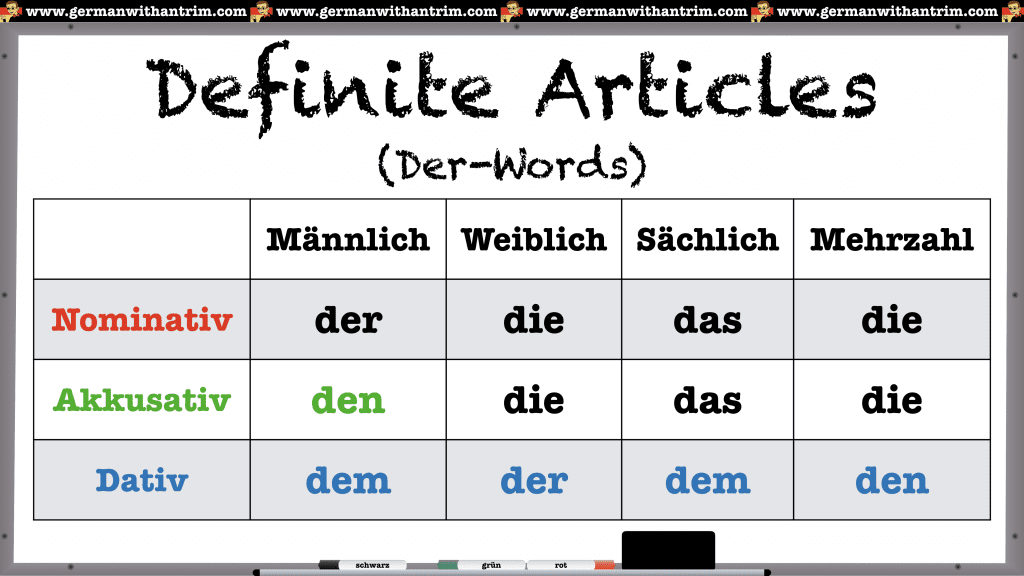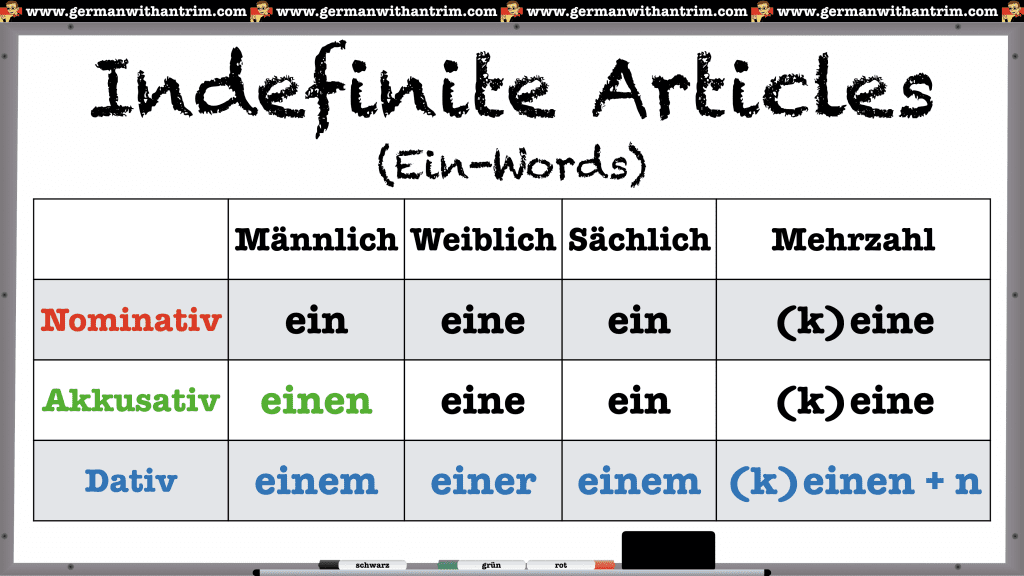
[ad_1]
On this enlightening lesson, we introduce you to the German dative case, an important facet of the language used for oblique objects, sure prepositions, verbs, and phrases. Be a part of us as we demystify this significant grammatical factor.


If you’re actually wanting to place your German studying on monitor, think about becoming a member of Herr Antrim’s Deutschlerner Membership! For simply $14.99 per thirty days you’ll get entry to his full A1 and A2 programs plus new supplies as he creates them. You’ll go from realizing zero German to with the ability to have a brief dialog in a brief few weeks. Earlier than it, you can be conversational in German on quite a lot of essential matters, all whereas mastering German grammar.
The Position of Nominative, Accusative, and Dative Instances
- Nominative Case: Used for the topic of the sentence, the doer of the motion.
- Accusative Case: Applies to direct objects, the receivers of the motion.
- Dative Case: For oblique objects, these receiving the direct object.
What’s an Oblique Object?
An oblique object usually receives the direct object of a sentence. Take into account these examples:
- Der Mann gibt deiner Mutter Blumen. (The person provides your mom flowers.)
- Dein Vater verpasst dem Mann ein blaues Auge. (Your father provides the person a black eye.)
In these sentences, ‘deiner Mutter’ and ‘dem Mann’ are the oblique objects.
Particular Articles within the Dative Case
Dative case articles rework from their unique type within the nominative case. Word the next adjustments:
- Nominative “der” (masculine) turns into Dative “dem”
- Nominative “die” (female) turns into Dative “der”
- Nominative “das” (neuter) turns into Dative “dem”
- Nominative “die” (plural) turns into Dative “den”

Keep in mind, these adjustments mirror the operate of the noun within the sentence, not a change in gender.
Instance Sentences: Nominative, Accusative, and Dative
Let’s see ‘der Mann’ in numerous roles:
- Der Mann geht ins Lebensmittelgeschäft. (Nominative: topic)
- Dein Vater schlägt den Mann. (Accusative: direct object)
- Dein Vater verpasst dem Mann ein blaues Auge. (Dative: oblique object)
Can Each Sentence Have an Oblique Object?
Not essentially. The presence of an oblique object depends upon the verb’s motion. Some verbs inherently can’t have oblique objects.
Clearly you should buy or promote somebody one thing, give them it, or ship them it, however you may’t be them one thing or go them one thing.
Increasing on Dative Case Utilization
Let’s discover how dative case is utilized throughout varied contexts:
- Herr Antrim bringt dem Doktor Deutsch bei. (Educating German to the Physician)
- Der Kellner bringt dem Mädchen ein Eis. (The waiter brings the woman an ice cream.)
- Die Lehrerin gibt den Schülern eine Hausarbeit auf. (The instructor assigns the college students a time period paper.)
Plural Dative Nouns Require N
Whenever you use a plural noun within the dative case, the article has an N on the finish of it. Along with this, nonetheless, additionally, you will often add N to the noun.
- Die Lehrerin gibt den Schülern eine Hausarbeit auf. (“der Schüler” turns into “die Schüler” within the plural, however within the dative case we use “den Schülern”)
The Distinctive Case of Weak Nouns
Sure masculine nouns, like ‘Polizist’, take an -n or -en ending in all circumstances besides nominative.
- Meine Schwester sagt dem Polizisten die Wahrheit. (“der Polizist” turns into “den Polizisten” within the accusative and “dem Polizisten” within the dative case.
Indefinite Articles and the Dative Case
The indefinite articles within the dative case align with the particular articles, making studying them easier. The final letter of every of the particular articles is identical because the final letter of the indefinite article in the identical place on the chart.

Complete Apply: Worksheet and Extra
For hands-on observe, be a part of the Deutschlerner Membership to obtain our oblique objects worksheet and have interaction with workouts that solidify your understanding of the dative case.
Extra Examples with Oblique Objects
beibringen
to show
Was bringt Herr Antrim den Schülern bei?
What does Herr Antrim train the scholars?
Herr Antrim bringt den Schülern Deutsch bei.
Herr Antrim is educating the scholars German.
bringen
to carry
Ich bringe meinem Hund den Knochen.
I carry my canine the bone.
Warum bringt der Hund dem Mann den Knochen nicht?
Why doesn’t the canine carry the person the bone?
erzählen
to inform
Ihre Tochter erzählt meiner Freundin die besten Geschichten.
Her daughter tells my girlfriend the perfect tales.
Was für Geschichten erzählt ihre Tochter deiner Freundin?
What sort of tales does her daughter inform your girlfriend?
geben
to offer
Sophia gibt dem Hund etwas Hundefutter.
Sophia provides the canine some pet food.
Was gibt Sophia dem Hund?
What’s Sophia giving the canine?
kaufen
to purchase
Ich kaufe der Obdachlose etwas Gutes zum Essen.
I’m shopping for the homeless girl one thing good to eat.
Warum kaufst du dem Obdachlose etwas auch nicht?
Why don’t you purchase the homeless man one thing, too?
sagen
to say
Der Lehrer sagt dem Schüler, dass er im Flur nicht rennen darf.
The instructor tells the scholar that he’s not allowed to run within the corridor.
Warum sagt der Lehrer dem Schüler, dass er nicht rennen darf?
Why does the instructor inform the scholar that he isn’t allowed to run?
schenken
to offer (as a present)
Der Reisender schenkt seiner Familie Andenken zu Weihnachten.
The traveller is giving his household souvenirs for Christmas.
Wann schenkt der Reisende seiner Familie Andenken?
When is the traveller giving his household souvenirs?
schicken
to ship
Der Politiker schickt den Wählern eine Postkarte.
The politician is sending the voters a postcard.
Was schicken Politiker den Wählern?
What do politicians ship the voters?
senden
to ship
Die Mutter sendet dem Variety quick nie eine SMS.
The mom hardly ever sends the kid a textual content message.
Warum sendet die Mutter dem Variety keine SMS?
Why doesn’t the mom ship the kid a textual content message?
vorlesen
to learn to somebody
Ein guter Vater liest seinem Variety jeden Tag ein Buch vor.
An excellent father reads his little one a ebook day by day.
Wie oft liest ein schlechter Vater seinem Variety ein Buch?
How typically does a nasty father learn his little one a ebook?
Different Dative Case Classes in This Collection
Oblique Objects with the Dative Case
What’s a dative sentence?
Private Pronouns of the Dative Case
Phrase Order with Direct & Oblique Objects
Prepositions Used with the Dative Case
Dative Prepositions and Their Widespread Verb Companions
Wechselpräpositionen (Two-Method Prepositions)
Wechselpräpositionen and Their Widespread Verb Companions with the Dative Case
Particular Dative Phrases
Dative Verbs
All the things Dative Case Supplies

If you’re actually wanting to place your German studying on monitor, think about becoming a member of Herr Antrim’s Deutschlerner Membership! For simply $14.99 per thirty days you’ll get entry to his full A1 and A2 programs plus new supplies as he creates them. You’ll go from realizing zero German to with the ability to have a brief dialog in a brief few weeks. Earlier than it, you can be conversational in German on quite a lot of essential matters, all whereas mastering German grammar.
[ad_2]